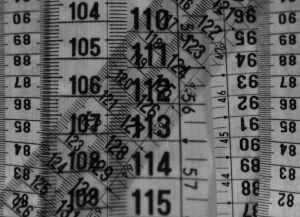Living in a “metric culture” (and CfP)

Self-measurement and tracking have become commonplace practices in recent years. With the explosion of apps and devices enabling the data capturing and monitoring of the individual’s everyday activities, behaviours and habits, an increasing number of people around the world are embracing this culture of self-quantification and tracking in the spirit of improving their health and wellbeing, and charting their fitness progress.
Back in 2007, Gary Wolf and Kevin Kelly from Wired Magazine established a group under the name, the Quantified Self, a term that captures precisely these growing practices of self-tracking through digital technology, promoting a new type of wisdom: “self-knowledge through numbers”. When the trend began, its followers were, as noted in the Economist, ‘an eclectic mix of early adopters, fitness freaks, technology evangelists, personal-development junkies, hackers and patients suffering from a wide variety of health problems.’ Now, and with the convergence of health apps and mobile devices, anyone with a smart phone, for instance, is likely to be engaged in one form of self-tracking or another, sometimes even unknowingly.
Ubiquitous Measure
What can be measured with self-tracking technologies? Everything, we are being told: sleep patterns, food intake, calorie expenditure, steps walked, heart-rate, glucose levels, and there are even apps and devices that can scan our mood and emotions, our levels of stress and anxiety as well as our very intimate “sexual performance”. And in economic terms, measuring the body and its activities is becoming a very profitable industry. According to the research company Statista, it is estimated that the market value of smart wearable technologies will be reaching 53.2 billion US Dollars in 2019.
Ethical and Political Implications
While this growing trend of self-tracking and quantification is often couched in positive promotional terms that highlight its value to the users and to their mental and physical health, it is also raising a host of concerns, ranging from privacy, surveillance and data ownership issues, to concerns about the excessive self-involvement and the pressure of self-improvement that often underscore the Quantified Self practices and ethos. This in turn requires a thorough examination of actual and potential ramifications of these growing practices. For although smart wearable technologies offer various benefits for health monitoring and management, there is also a need to be vigilant about the kind of future that is being designed through the infiltration of such technologies in everyday life where self-tracking and health data monitoring is at risk of becoming the norm rather than a voluntary option.
Conference — Metric Culture: The Quantified Self and Beyond
We are organising an international conference at the Aarhus Institute of Advanced Studies, Denmark, 8–9 June 2017.
Confirmed keynote speakers:
Deborah Lupton (University of Canberra, Australia)
Rosalind Gill (City University London, UK)
The overarching aim of this international conference is to critically engage with the nuanced aspects and multifaceted implications of living in a metric culture. Together we will explore the social significance and cultural role of self-tracking practices, exploring the motivational forces that propel people to participate in such practices. We aim to look at the ways data and metrics link to understandings and representations of self and identity, to issues of power and control, and to questions of value and agency. We will also seek to interrogate the kinds of ontologies, relations and communities that are emerging out of the hybrid interweaving of body and technology in the context of the Quantified Self practices and beyond.
By bringing together relevant scholars who are engaged in the study of the social, political, cultural and ethical dimensions of self-tracking practices and related technologies, the conference aims to provide critical insights and nuanced reflections on the way metric culture is unfolding within and affecting the various spheres of our lives, and how it is reshaping our relation to our bodies, vitalities and surroundings.
Conference web link: http://metriclife.net/whats-on/international-conference_-metric-culture-the-quantified-self-and-beyond/
We invite submissions (theoretical, empirical, visual or performative) on topics related (but not limited) to:
- Histories and genealogies of self-tracking and quantification
- Sociology and philosophy of wearable technologies and ubiquitous computers
- The social life of self-tracking practices and data
- Self-tracking and social media
- Self-tracking and biomedia
- Quantified Self communities
- Quantified Self and Big Data
- Quantified Self and healthcare
- Quantified Self and the insurance industry
- Quantified Self and the law
- Quantified Self and the environment
- Quantified Self and surveillance
- Quantified Self at the workplace
- Politics of metrics within academia
- Methodological issues in researching the Quantified Self and metric culture
We are particularly interested in contributions from the fields of Media and Cultural Studies, Digital Culture, Sociology, Philosophy, Anthropology, Medical Humanities, Surveillance Studies, and other related disciplines. Participation of the Quantified Self community itself is also highly encouraged.
Deadlines and contact information:
Abstracts (max. 200 words) and a short biographical note (max. 100 words) should be sent by 10 Nov 2016 to bajana@aias.au.dk
Conference registration fee:
Academics and presenters: 1000 DKK
Students and the general public: 150 DKK
The conference fee covers all conference materials, coffee breaks, lunch, and conference reception.
Twitter: @MetricLife


